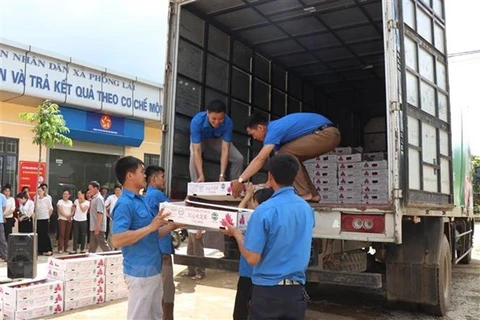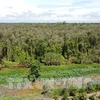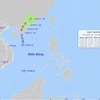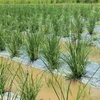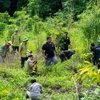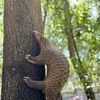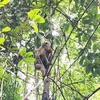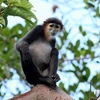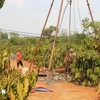Ben Tre (VNS/VNA) – The Mekong Delta province of Ben Tre has basically controlled the spread of the coconut black – headed caterpillar after local authorities and farmers took intensive measures to destroy it.
In July last year, the country’s largest coconut-growing province reported the appearance of the pest for the first time on a total area of 2.4ha of coconut in Binh Dai district’s Phu Long commune.
It eats leaves and the husk of immature coconuts, damaging the fruits and reducing yields.
It is endemic in countries like India, Sri Lanka and Thailand.
Some 393ha of coconut trees have been affected in the province so far, according to its Plant Protection and Cultivation Sub-department.
More than 100ha have been treated and many of the trees are recovering well.
The province has used pesticides including bio-pesticides to kill the pest, using drones to spray them on more than 30ha in Phu Long last August.
Huynh Quang Duc, deputy director of the province Department of Agriculture and Rural Development, said the pest has been eradicated to a great extent in localities first affected by the pest such as Binh Dai and Chau Thanh districts and Ben Tre city.
Others are continuing to taking preventive measures, he said.
Tran Van Can of Chau Thanh’s Huu Dinh commune has a 2,000sq.m coconut grove affected by the pest and he has sprayed pesticides.
It has not been damaged too much and has started to have shoots again and fruits, he said.
Vo Van Nam, head of the sub-department, said the districts of Mo Cay Bac, Mo Cay Nam, Chau Thanh, and Binh Dai, and Ben Tre city have completed the first round of pesticide spraying.
The province has also cut down 4,659 severely damaged trees.
The Ho Chi Minh City University of Agriculture and Forestry and the Department of Agriculture and Rural Development have released 150 pairs of ong ki sinh dui to (Brachymeria sp), a parasitic wasp, on a 2ha grove in Mo Cay Bac where pesticides have not been sprayed as a biological agent to control the pest.
The sub-department has trained local agriculture officials in breeding earwigs, another creature that preys on the caterpillar.
The province plans to increase the breeding of earwigs and release a total of 28,000 of them in affected groves this year.
The department will step up advocacy activities to encourage farmers to take proper measures to fight the pest.
For instance, in groves in which ong ki sinh dui to and earwigs have been released, farmers should not spray pesticides.
Ben Tre has more than 72,000ha under coconut, or more than 42 percent of the country’s total./.
In July last year, the country’s largest coconut-growing province reported the appearance of the pest for the first time on a total area of 2.4ha of coconut in Binh Dai district’s Phu Long commune.
It eats leaves and the husk of immature coconuts, damaging the fruits and reducing yields.
It is endemic in countries like India, Sri Lanka and Thailand.
Some 393ha of coconut trees have been affected in the province so far, according to its Plant Protection and Cultivation Sub-department.
More than 100ha have been treated and many of the trees are recovering well.
The province has used pesticides including bio-pesticides to kill the pest, using drones to spray them on more than 30ha in Phu Long last August.
Huynh Quang Duc, deputy director of the province Department of Agriculture and Rural Development, said the pest has been eradicated to a great extent in localities first affected by the pest such as Binh Dai and Chau Thanh districts and Ben Tre city.
Others are continuing to taking preventive measures, he said.
Tran Van Can of Chau Thanh’s Huu Dinh commune has a 2,000sq.m coconut grove affected by the pest and he has sprayed pesticides.
It has not been damaged too much and has started to have shoots again and fruits, he said.
Vo Van Nam, head of the sub-department, said the districts of Mo Cay Bac, Mo Cay Nam, Chau Thanh, and Binh Dai, and Ben Tre city have completed the first round of pesticide spraying.
The province has also cut down 4,659 severely damaged trees.
The Ho Chi Minh City University of Agriculture and Forestry and the Department of Agriculture and Rural Development have released 150 pairs of ong ki sinh dui to (Brachymeria sp), a parasitic wasp, on a 2ha grove in Mo Cay Bac where pesticides have not been sprayed as a biological agent to control the pest.
The sub-department has trained local agriculture officials in breeding earwigs, another creature that preys on the caterpillar.
The province plans to increase the breeding of earwigs and release a total of 28,000 of them in affected groves this year.
The department will step up advocacy activities to encourage farmers to take proper measures to fight the pest.
For instance, in groves in which ong ki sinh dui to and earwigs have been released, farmers should not spray pesticides.
Ben Tre has more than 72,000ha under coconut, or more than 42 percent of the country’s total./.
VNA


